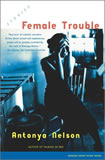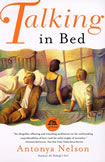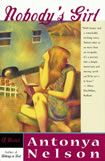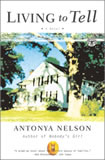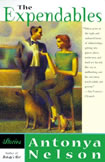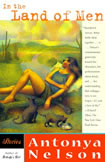|
||||||||
|
|
||||||||||
|
|
Strike Anywhere
|
||||||||||
 * * |
Inside the bar Dwight took his stool. He hadn't been to The White Front since February but of course nothing had changed. No seasons here. There was payday, and happy hour, and closing time. There was the first sip, the free round, and the flung-back shot that was a flat-out mistake. On the wall, the Hall of Fame. Your picture, a gold star pressed reverently on the glass if you happened to be dead. No matter how long you abandoned this place, it was waiting when you returned. Welcome to Miller Time.
"Dwight," said the bartender.
"Frozene," said Dwight, admiring himself in the mirror under the stuffed jackalope, beside the landscape painted on a handsaw. The Coors waterfall fell. "Jack and a Bud back."
Frozene nodded, polishing with her damp cloth diaper the worn wood before her new customer. Frozene's adopted parents had owned the White Front; she'd lived here all her life. At the other end of the bar sat the young wife of the jeweler. Mrs. Donoglio, the second. Her husband's shop of sapphires was just down the block. An old man with a dowager's hump, he looked through his eyepiece at you when you entered his business, a giant wet oyster of a glance, suspicious and unctuous, at once. Along with setting stones, Mr. Donoglio fixed watches. Fine motor, his skills were. His first wife had died a few years ago, alone upstairs while downstairs he catered to the town's meager tourist population. This new wife had come from Missoula, a college girl, bored here, a religious drinker and smoker always with her nose in a book.
"Hey miss merry sunshine," Dwight called to her. She shared only one trait with his own wife: they both thought they were better than him. However, this one's sullenness cheered him, set him in heckling mode. She waited a second before looking up, holding her place on the page with a finger.
"Don't be telling me to turn that frown upsidedown," she warned.
"Sourpuss," Dwight said. Habitually she laid a twenty on the bar and drank gin and tonic until there were only a couple of damp bills left for a tip. She lived a twenty dollar day; think what she might save, Dwight thought. After, she walked back to the jewelry store where she made her home upstairs, in the same bed, Dwight supposed, where the first wife had died. This scrawny female, profane and sarcastic, wearing Wranglers like a man, hair cut by her own hand, ready to swear at you and your cowpoke ideas, she seemed to think she was the first educated drinker the bar had ever served. Oh, by the way, Dwight could say, there was such and such the famous writer here once, also from Missoula, who set his famous poem, a moment of it, anyway, in the jail house beside Dwight's very own home, right up the hill. He could send that snooty girl, the sapphire king's young second wife, to the copy of the poem that hung in the back of the bar, typed up and yellow, signed by the poet himself. Now who's smart, Dwight could say, now who's God's gift.
"What?" she demanded.
Whoops. Drinking, he often found himself inside out, thoughts transformed into words, urges into action. "Can't a fellow be glad to see you?"
"Unlikely," she said. "Extremely."
"I'm an unlikely type," he allowed, magnanimous as could be. Alcohol, its proximity and promise, spread wings in his chest.
"You and that freak," she said, indicating the customer who'd just entered. This was the crazy man with his piggybacked pets, the dog, the cat, the mouse, each member of the foodchain sitting smack on the back of his enemy. The mouse was never the same mouse for long. The freak was notorious from last summer, when the tourists had fawned over him. Nobody local- that is, nobody who had to deal with him day in, day out - made eye contact. His eyes were the intense heat-seeking ones of barely-contained insanity. They wanted more than to see. Now he asked for and received a beer and a bowl.
"Here you go," he said, loud enough for others to listen in, dipping his fingers tenderly in his drink to let his creatures lick it off. "Who sits on Mr. Mouse, you might ask," he asked the air. "Fleas! I say!"
Dwight raised his eyebrows at the college snot, colluding gamely. It was good to know that the two of them, while drinking in the daylight hours in the afternoon of the lord, had not stooped to animal tricks.
The jeweler's wife pushed herself ungracefully from her barstool and headed for the women's room, where she'd sneer at the sign that told her No more paper products? Wipe your ass with a spotted owl! But then Dwight saw what had happened to her since February: she'd gotten big with child. When she returned she scowled at his appraisal of her.
"That's right," she said. "So just spare me the lecture. You and that frigging pharmacist. 'Madam, I hope you realize that Valium and prenatal vitamins are not a winning combination?' Oh, really? Go ahead, call the SPCA, you can report a twofer, me and the mouse-eat-dog sandwich over there."
The freak looked hurt but the bartender, like all wise bartenders, was keeping strictly out of it. Between her and the customers was a definite barrier: the literal bar itself, and her authority to cut them off. The Confederate flags hanging everywhere like a promise of loaded weaponry and a willingness to use it. Plus her simple, relentless sobriety; Frozene, legend had it, had been traded as an infant for a bottle of beer. One beer for one baby, her new parents the bartenders making the exchange. Just cockeyed enough to be true. Besides Frozene and Dwight and the jeweler's wife and the freakshow, three Mexican construction workers sat at a far table speaking Spanish, ignoring all the whites, nutty or not. There was no one to whom Dwight could voice an appeal.
"I didn't know you were in a family way," he said.
"Oh the family way," said the jeweler's wife, slapping open her book and glaring into its pages.
 * * |
Out in the truck, Ivan cracked the passenger window. The air smelled of mown grass. His stomach rumbled. He rustled the grocery sack idly, lighter fluid and matches. If only they hadn't needed these. Strike anywhere, the box instructed. Ivan opened the, package and was pleased to see the plenitude, the rows of patriotic little sticks, white, red, and a blue dot like a berry on each of a hundred tips. He removed one of the ranks and stuck it in his mouth, first exploring the bland square end between his teeth as it turned, then reversing the match.
He chewed thoughtlessly. The match tasted like something he'd only smelt before, a curious crossover sensation. He had a missing tooth - "Canine incisor" his sister Leanne had informed him - and the matchstick slipped into the space in a soothing fashion, his gum tender yet pleasantly satisfied by the square plug of wood. Eventually, he pulled the denuded stick from between his lips. He could not tell one end from the other, now. His mouth felt oddly dry. He removed another match from the box and set to work. Time could pass this way, he thought. You needed a way to pass time. After his father had entered the bar, the man with the three pets had followed. Ivan liked this man, the way he would stop on the street and let you stroke his animals. They were tame. The kitty rode on the dog's back. The mouse sat atop the kitty. Ivan, all the children, were cheered by the way they got along. "The lion shall sleep with the sheep," the man claimed, "Heaven is liketh that, a peaceable kingdom." The man's eyes reminded Ivan of horse eyes, big and brown, lacking the common tiny pupil that most humans possessed. What would you see, without those little black pinpoints?
"Ivan!" a pack of girls called, banging on the hood. His oldest sister's friends, they adored teasing him, rubbing his head, wiggling his ribs. They clustered around, wearing what his sister wore, belly buttons one and all on display, henna tattoos wandering their wrists, hair washed and stylishly wild just for a saunter down Main. They were seeking other boys, in other trucks.
"You hungry, Mr. I?" one asked, grinning, showing her mouth of metal, tiny rubber bands blue and white, the high school colors.
"You want a cigarette to go with that match?"
"Maybe a bottle rocket?"
"You see that guy?" the girl named Kimmy inquired, hushed, watching the White Front door as if the man with his pets might pop right back out. "Well, my mom and me took one of his mice. We found it in the Trusty Donut Shop. We knew it was his 'cause it was so tame and all, like on downers. Now it lives in my mom's dollhouse, that one with the lights?"
"Your mom lets it go poop in her dollhouse?"
"Oh hell no. She's got him in little mouse diapers. Diapers and a dress. But he won't wear the hat."
"Whatsup with this?" Margot leaned over to ask Ivan, bent at a severe right angle at the waist, swinging her rear and chewing a tiny piece of gum at his window. He smelled cinnamon, Big Red. She was the prettiest, the girl her friends had designated royalty. Ivan could see down her tank top, a mole, a pimple, her small pale breasts. "You get to come downtown, but not Leanne?"
"Where's Leanne?" the others asked, a vague refrain to accompany their skittery glances. They were following the traffic, endlessly running their fingers through their hair, over their hips, touching the comers of their shiny, shiny lips. They studied their reflections in the rearview, in the store windows, in each other's eyes. They pulled their shirts down, then stretched their bare arms to make their navels wink into view. For belts, they wore slim silver chains.
Ivan smiled around his match, His sister's friends used his father's truck the way moths used a streetlight, just fluttering.
"You think that weirdo misses his mouse?" Margot asked Ivan before she sauntered away, snapping her gum. But Ivan wondered if the mouse missed his man.
 * * |
Dwight, on his third set of drinks, genuinely curious, asked the bartender if it was legal to serve a pregnant woman.
"Is it legal to serve a sanctimonious hypocrite?" said the jeweler's wife, face still in her book. She might have fooled some people, but Dwight had noticed the pages weren't turning. "You and Mr. Science at the pharmacy, him in his lab coat and his bulletproof glass with the little speak-hole."
"Live and let live," said the wise Frozene.
"Then we agree," said Dwight. "But see, my problem is, she's not letting that wee thing live. I mean, you've heard tell of the deformed infants, you seen that shit on the Discovery channel."
"Discover this," the girl said, blowing a fat raspberry. Dwight laughed. He loved the ones who sassed back. Why, he asked himself, why did he love them? His wife didn't sass; she wept. Pathetic. She prayed and wrote in her diary and she used to talk to her sister on the phone, but nowadays he noticed she was talking to their oldest girl, Leanne. When Dwight found himself driven to strike his wife, she never struck back. From the beginning, he'd understood she was not ideal for someone like him. This one at the bar would have given him a run for his money. Resistance was sexy; maybe she and the jeweler had some knock-down, drag-outs. The thought made Dwight reconsider the old guy with his monocle.
"Listen up," he said, "you've got your warnings on every bottle of liquor in here, just look at 'em." Dwight pointed at his own Bud and its pregnant woman clause. "Warning!" he shouted down to the jeweler's wife.
"Fuck! Off!" she shouted right back, which raised Frozene's watchful brow. Briefly Dwight pictured the husband dashing around that old iron bed, revving for this hellcat, his one magnified eye swimming after her. Dwight laughed again. He loved liquor; the past three months without it felt to him like a humiliation, a sentence he had served for bending to his wife's will. And now his reward was a barbecue. Ice cream and cake. Getting through those months had not made him proud. It had been one dreary day at a time, lined up behind him like empty boxes, a train of hollow testament to his wife's saintliness and his own pussy-whippedness. He closed his eyes to visit the full rosy bloom inside his head, the fiery flaring heat. You either quit drinking or you ended up in the Hall of Fame with Shreve and Helmar and Evert and Tiger and Tex and all the rest, each and everyone raising a glass for the camera, their tiny gold stars applied later, when it was over. Rehab is for quitters, Dwight's favorite bumper sticker said.
The Mexicans took themselves to the Keno machines to make some hopeless wishes with their wrinkled dollar bills. On the huge television hanging ominously over the room played the country music station, complete with captions for the hearing impaired. Through the bar's front door drifted three slaphappy school teachers, spouseless and silly. The jeweler's wife didn't look up, the freak bent to confide into his dog's ear, and when the new people had settled, called their orders out, and started talking among themselves, Dwight rose to say howdy.
"Easy," warned Frozene, and Dwight reassured her with an innocent hand.
"Let me just ask you all something, you mind?" he began. They looked up gamely, one of the women he recognized as Leanne's teacher, and who, he discerned, recognized him. Not necessarily favorably. "You see that young lady over yonder?" Now the woman's smile trembled, her sensing, before her companions, that they were being enticed into a drama where they did not belong. Dwight insisted, "You see her? That smart girl reading a book and sucking on a long tall drink?" The jeweler's wife, Dwight realized, was closer to his daughter's age than his own, a fact that derailed him briefly. "Well," he went on, finishing what he'd started, "guess what?"
Because he obviously wasn't going anywhere until they guessed what, one of the school teachers cleared her throat, took a breath, and said, "What?"
"Pregnant!" Dwight declared. "That's what. Just as knocked up as she could be, drowning her little one in liquor. Now just what in the hell you think of that?"
They stared, sighing, this threesome of educators who'd rendezvoused for a giddy margarita at the tail end of the semester, who came to the- White Front maybe once or twice a year, escaping the monotonous industry of responsibility, who, frankly, couldn't count the jeweler's wife among their concerns, and who finally politely, fearfully, ventured the opinion that the bartender had: none of their business. Dwight looked shocked, though he wasn't. Teachers. They'd confirmed a certain suspicion of his.
"Hey Hortense," Dwight said when he returned to his stool. "Isn't that your name?" It was the ugliest name he could think of. The jeweler's wife didn't even look up. Just transferred a burning cigarette to her left hand and raised the third finger of her right, nailbitten, both hands utterly ringless despite her husband's profession.
Smiling, Dwight glanced languidly in the direction of the freak's table. There, he finally made out that the man was dangling the mouse by its tail before the cat's whiskers. Back and forth the gray thing swung, its front fingery paws twitching together as if steepled in prayer, the freak gazing on as if to hypnotize himself. But why, you had to wonder, didn't the cat snatch at the creature?
 * * |
Ivan was making a house with matchsticks on the truck's dusty dashboard. The girls had moved on, glossy hair, languid hips, tottery platform shoes, rowdy voices, their bright shirts each bearing a message: Hard Rock Cafe, Angel, Mischief The sun had fallen but the evening was light, temperate. A woman pushing a baby carriage had just walked by. At first, Ivan thought she was speaking to him, her mouth uttering sentences in his direction, catching him, he thought, as he ate his matches. But then he had realized, as she passed, that it was the baby she spoke to in front of her in his stroller, the little guy waving his hands, cross-eyed, trying in vain to catch his own waving bare feet.
The rule was that Ivan could only use the naked matches to shape his house. Their square sterns were like tiny one-bys. If he bit down, they threatened to give, like crisp carrots. Once he softened the wood beneath the tip, the red and blue substance melted quickly in his mouth. The taste was neither good nor bad, the flavor one that Ivan had grown accustomed to. He was reminded of the Fourth of July, the sizzle of sparklers. His house needed twenty-nine matches; he had completed the walls and windows and roof and was working on the chimney when he noticed the man.
Beside The White Front, in the dark entryway of the defunct wedding dress shop, a shadowy shape suddenly began moving. Inside the old shop windows remained the damaged mannequins whose rusty satin gowns still hung on their amputated figures, handless, some, headless others. Fake eyelashes clung like daddy-long-legs on the remaining pink plastic cheeks. The moving shadow emerging from between the dress windows assumed a human form, pale face first and then animate body, shocking, like a broken down groom stepping out of the ruined wedding party. The dolls smiled but not the man.
Ivan watched wide-eyed as the man carne forward, lurching, wavering, like a marionette manipulated by a child, one moment upright, the next heaping limp on the sidewalk, where a high school couple had to veer around his flung, booted, foot.
"Totally trashed," noted the boy in the couple, and the girl fanned the air before her nose.
Then Ivan recognized the loose-limbed figure as Kermit Boyer, one of a few drunk men who haunted Portersburg, the quiet one who slept in a horse stable just outside town. Kermit gathered himself delicately from the pavement, collapsed skeleton in his flexible rubble. Ivan was tempted to aid him, to fetch the white cards that had snowed from his pocket which Kermit seemed not to have noticed. He gained his knees and then his feet, swaying there. He closed his eyes very slowly and then focused on Ivan through the windshield, lining up his gaze like a pair of floating compass needles. He aimed himself for Ivan's father's truck. The match in Ivan's mouth went wildly into and out of the empty socket. Kermit reached the truck's hood and melted onto it, sliding along the fender, grabbing onto the side mirror of the passenger door like a handle. His fingers were brown, crazy with scratches and scabs. His face was like a large rotten apple.
"Little boy," said Kermit Boyer, rapping with his free hand against the glass.
Ivan scooted to his father's side of the truck, beneath the steering wheel. His fingers trembled on the horn, ready to alert the people in the street, who would turn then and rescue him from his nightmare, this desperate drunken figure. When his father came home drunk, his mother hurried the children upstairs to their rooms. His father was not a bad man, she would explain. Only Leanne had the nerve to yell at him. "Drunk jerk!" she would shout from the top of the steps, and his father would yell right back up at her. "Hussy slut!"
Ivan, like his mother, suffered those words. Please God, the two of them whispered.
"Please," his father often sneered, "is the beg word."
In the locked truck, in the oncoming dark, Ivan's fear paralyzed him, Kermit's appearance, its suddenness, its ugly publicness, a person crawling like an animal on the sidewalk, draped like dirty laundry on his father's vehicle. . .
"Little boy," Kermit Boyer repeated, his fingertips now inside the passenger window, chapped lips at the crack. A missing tooth, Ivan noticed, canine incisor like his own, whiskers, loose jowls, eyes loopy. "Little boy, don't do that," he said, his breath powerfully upon Ivan, a wave of sour ferment. "Don't eat the matches, boy," he said, "Good lord, son, that's poison!"
The stick in Ivan's mouth stopped. And then Kermit abruptly disappeared, dropped like a felled deer, unstrung puppet, onto the cooling pavement beside the truck.
© Antonya Nelson

